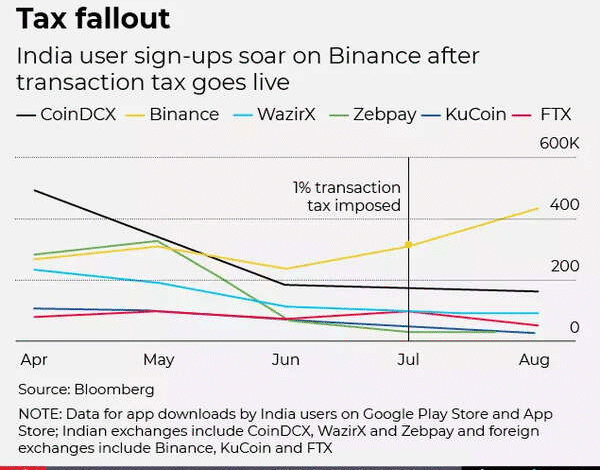Crypto Tax Evasion India: Over 44K Notices Issued

Crypto tax evasion in India has become a focal point as the government ramps up its cryptocurrency tax enforcement initiatives, targeting a staggering 44,057 investors for failing to report their virtual asset transactions. The Central Board of Direct Taxes (CBDT) has taken significant steps to address these irregularities, utilizing advanced data analytics to uncover hidden income from cryptocurrency investments. With the recent introduction of stringent regulations governing virtual digital assets (VDAs), compliance has never been more critical for crypto investors in India. The penalties for non-compliance can be steep, forcing many to reevaluate their cryptocurrency tax reporting practices to align with the latest guidelines, including the need for more robust reporting on VDA transactions. As the enforcement actions unfold, it is evident that the government is committed to ensuring tax compliance within the burgeoning crypto market, making it imperative for investors to stay informed and prepared.
In recent months, the Indian government has intensified its focus on tax compliance related to digital currency holdings, exposing a worrying trend of tax evasion linked to cryptocurrencies. This crackdown reveals how the authorities are actively monitoring virtual asset transactions, ensuring that investors are adhering to regulatory frameworks established for digital assets. As the Central Board of Direct Taxes lays down new guidelines for cryptocurrency tax reporting, it becomes essential for individuals engaging in crypto investments to remain vigilant about their financial disclosures. Moreover, the use of data-driven tools to detect discrepancies in income tax returns underlines the growing importance of transparency in VDA dealings. The intertwining of finance and technology in crypto trading not only opens up investment opportunities but also subjects investors to rigorous tax obligations that must not be overlooked.
Understanding Cryptocurrency Tax Enforcement in India
Cryptocurrency tax enforcement in India has gained momentum as the government seeks to regulate the booming digital asset market. The Central Board of Direct Taxes (CBDT) has established a framework to ensure compliance, primarily targeting virtual digital assets (VDAs). With advancements in technology and data analytics, authorities can uncover discrepancies between reported and actual transactions made by crypto investors. This rigorous approach not only aims to increase tax revenue but also to foster a culture of transparency among taxpayers.
The rise in cryptocurrency trading has led to significant tax implications, and investors must be aware of their obligations. Non-compliance can result in substantial penalties and legal repercussions. As the market continues to grow, the CBDT has introduced measures like the NUDGE initiative, aimed at guiding taxpayers to fulfill their obligations efficiently. By leveraging data-driven insights, the government hopes to educate investors about compliance while reducing the opportunities for tax evasion.
The Role of CBDT in Cryptocurrency Tax Compliance
The Central Board of Direct Taxes (CBDT) plays a crucial role in ensuring cryptocurrency tax compliance in India. Through various initiatives and stringent enforcement actions, the CBDT aims to monitor the VDA market closely, identifying irregularities and non-reported income. The recent surge in tax notices sent to over 44,000 crypto investors indicates the department’s commitment to holding investors accountable. By utilizing advanced tools and data analytics, they can effectively track transactions and enforce applicable tax laws.
Moreover, the CBDT’s focus on taxpayer education is essential to promote compliance. Programs designed to inform investors about the specific tax responsibilities related to their cryptocurrency holdings exemplify this commitment. The introduction of the Non-Filer Monitoring System (NMS) has enabled the CBDT to compare user activity against tax returns, ensuring that discrepancies are swiftly addressed. Overall, the proactive measures taken by the CBDT signify a comprehensive approach to cryptocurrency taxation, aimed at optimizing revenue while facilitating a clearer understanding of tax responsibilities.
The Financial Impact of Crypto Tax Evasion
The financial implications of crypto tax evasion in India are staggering, as non-compliance leads to significant loss in revenue for the government. In FY 2022-23, tax collected from VDA transactions soared to ₹705 crore (approximately $80.50 million), but this is only the tip of the iceberg. Enforcement actions have unearthed an additional ₹630 crore ($71.94 million) in concealed income, highlighting the scale of tax evasion within the crypto space. These figures underline the importance of stringent enforcement mechanisms as the government seeks to rectify the losses caused by non-compliance.
The introduction of tax regulations on VDA transfers has created a new landscape for investors, compelling them to be vigilant about their tax responsibilities. With the penalties for tax evasion increasing, investors must ensure their activities are adequately reported. The growing financial impact of unreported crypto transactions serves as a wake-up call for both seasoned and novice investors to stay informed about their legal obligations and to report accurately in their income tax returns.
Navigating Crypto Tax Reporting in India
Navigating crypto tax reporting in India is crucial for all investors involved in VDA transactions. Proper reporting is necessary not just to comply with regulations but also to avoid potential legal issues stemming from tax evasion. The process can be daunting, especially for those unfamiliar with financial regulations associated with cryptocurrencies. Therefore, it is imperative for crypto investors in India to familiarize themselves with the necessary documentation and reporting requirements to ensure compliance with the Income Tax Act.
The introduction of crypto tax regulations has provided investors with a framework for reporting their earnings and profits. Investors must regularly update their records, documenting every transaction made in cryptocurrencies and participating in CBDT initiatives like the NUDGE campaign designed to assist them. Knowledge of the tax implications associated with digital assets, such as capital gains tax, is essential to create a comprehensive tax strategy that minimizes risk and ensures compliance. By staying informed and proactive, investors can successfully navigate their tax responsibilities in this evolving landscape.
Key Compliance Strategies for Crypto Investors
For crypto investors in India, developing effective compliance strategies is critical to mitigating risks associated with tax evasion. One key strategy involves maintaining meticulous records of all VDA transactions, including dates, amounts, and the nature of each transaction. This practice not only facilitates accurate reporting but also provides investors with documentation needed in case of audits or inquiries from tax authorities. Utilizing digital tools and software dedicated to crypto accounting can make this process more manageable and efficient.
Another critical component of compliance is staying updated on the latest regulations and guidelines issued by the CBDT. Tax laws concerning cryptocurrencies are continually evolving, and investors should make it a priority to familiarize themselves with these changes. Engaging with tax professionals who specialize in cryptocurrency can offer valuable insights and help navigate the complexities of crypto tax compliance, ensuring that investors remain compliant while maximizing their tax efficiency.
Future Prospects for Cryptocurrency Tax Enforcement in India
The future of cryptocurrency tax enforcement in India is poised for significant evolution as the government enhances its regulatory framework. With increasing awareness and resources dedicated to monitoring virtual digital asset transactions, the CBDT’s capability to enforce compliance will continue to grow. Investors can expect to see stricter enforcement actions and possibly more comprehensive regulations as the government seeks to optimize tax collection from this burgeoning asset class.
As cryptocurrency adoption becomes more mainstream, the need for a transparent and fair tax system will be paramount. The evolution of technology, particularly in data analysis and surveillance, will empower the CBDT to detect and combat tax evasion effectively. In this context, crypto investors must stay informed about regulatory developments and ensure that they adapt their practices appropriately to remain compliant in an ever-changing landscape.
The Importance of Transparency in Crypto Transactions
Transparency in cryptocurrency transactions is essential for fostering trust among investors and regulators alike. As the digital asset market grows, the need for clear reporting practices becomes increasingly vital. Investors must ensure that they are transparent about their VDA transactions, as this can impact their tax obligations significantly. By adhering to principles of transparency, crypto investors can mitigate the risk of discrepancies in reporting and foster a more positive relationship with tax authorities.
The importance of transparency also extends to the broader implications on the cryptocurrency ecosystem. Openness in transactions can help legitimize the sector, attracting institutional investment and consumer confidence. Regulatory bodies, including the CBDT, are likely to reward those who demonstrate integrity and transparency in their reporting practices. As the Indian crypto sector matures, embracing transparency will be crucial for sustainable growth and acceptance within the formal economy.
Guidance for First-Time Crypto Investors
First-time crypto investors must navigate a landscape filled with regulatory requirements and potential pitfalls. Understanding the tax responsibilities associated with cryptocurrency investments in India is crucial for success. New investors should take the time to educate themselves about the various types of transactions, tax regulations regarding VDA transfers, and the reporting obligations stipulated by the CBDT. Awareness of these elements will heighten their chances of compliance and help avoid the consequences of tax evasion.
Beyond mere awareness, first-time investors should seek out resources and tools that can aid in managing their investments and associated taxes. Utilizing crypto tax software or consulting with tax professionals can provide invaluable guidance tailored to their unique investment strategies. By employing these resources, new investors can navigate the complexities of cryptocurrency taxation with greater ease and confidence, ultimately ensuring compliance with tax laws and optimizing their investment returns.
Overcoming Challenges in Crypto Tax Reporting
Challenges in crypto tax reporting can be daunting for investors, particularly given the complex nature of cryptocurrency transactions. Many investors struggle to accurately track the details of their trades and the associated gains or losses, especially with frequent trading and the volatile nature of the market. This can lead to confusion about tax obligations and, in worse cases, unintentional tax evasion. Therefore, it is essential to develop a robust system for documenting transactions that allows for clear tracking and reporting.
Additionally, the constantly changing regulatory landscape poses a significant challenge for investors trying to stay compliant. New policies and guidelines can emerge rapidly, making it difficult to keep up with the latest requirements. To overcome these challenges, investors should consider joining forums or groups focused on cryptocurrency education where they can exchange experiences and solutions. These communities often provide valuable insights, tips on best practices, and updates on regulatory changes, helping investors stay informed and aligned with their reporting obligations.
The Future of Cryptocurrency Tax Regulations
The future of cryptocurrency tax regulations in India is likely to be shaped by the growing importance of digital assets in the financial landscape. As more stakeholders enter the market, regulators, including the CBDT, may introduce more comprehensive frameworks to ensure compliance and reduce opportunities for tax evasion. Investors should prepare for a more structured regulatory environment that mandates greater transparency and accountability in their crypto transactions.
With evolving tax regulations on the horizon, education and awareness will be paramount for investors. Staying informed about developments in cryptocurrency laws and taxation will be essential to successfully navigate the coming changes. Investors must understand their responsibilities, utilize available resources, and remain prepared for adjustments to their tax reporting practices to align with future regulations.
Frequently Asked Questions
What is the current state of crypto tax evasion in India?
Crypto tax evasion in India is a significant issue, with the Central Board of Direct Taxes (CBDT) launching a major campaign to enforce tax compliance among cryptocurrency investors. Recently, over 44,057 notices were sent to investors who failed to report their virtual digital asset (VDA) transactions in their tax returns.
How does the CBDT ensure compliance with cryptocurrency tax reporting in India?
The CBDT ensures compliance with cryptocurrency tax reporting through various initiatives, including data analytics tools such as Project Insight and the Non-Filer Monitoring System. These tools help link VDA transactions and flagged discrepancies between declared income and actual data from virtual asset service providers.
What impact do VDA transactions have on crypto taxation in India?
VDA transactions have a considerable impact on crypto taxation in India. Under section 115BBH of the Income Tax Act, the tax generated from VDA transfers was approximately ₹705 crore for FY 2022-23 and FY 2023-24, highlighting the significance of proper reporting and compliance among crypto investors.
What measures are being taken to combat cryptocurrency tax evasion in India?
To combat cryptocurrency tax evasion in India, the CBDT is actively guiding taxpayers and conducting e-verification and reassessments, as well as search-and-seizure operations where necessary. They have also launched initiatives like the NUDGE campaign to improve taxpayer awareness regarding VDA reporting.
What should crypto investors in India know about their tax obligations?
Crypto investors in India should be aware that all VDA transactions need to be reported in their income tax returns. Failing to do so could lead to tax evasion claims and penalties, as the CBDT actively monitors compliance through data analytics and sends notices to non-compliant taxpayers.
How are discrepancies in cryptocurrency tax filings identified by the CBDT?
The CBDT identifies discrepancies in cryptocurrency tax filings using advanced data correlation techniques. By comparing TDS returns from cryptocurrency service providers with taxpayers’ disclosures in their returns, they can pinpoint inconsistencies that may indicate tax evasion.
| Key Point | Details |
|---|---|
| Crypto Tax Enforcement Campaign | India is enforcing a campaign focused on cryptocurrency tax compliance. |
| Notices Sent to Investors | 44,057 notices were sent by the CBDT to crypto investors who did not report their earnings. |
| Financial Impact | The enforcement has resulted in ₹705 crore declared tax and ₹630 crore of undisclosed income discovered. |
| Nudge Campaign | The NUDGE initiative aims to educate taxpayers about reporting VDA transactions. |
| Data Analytics Tools | The CBDT uses tools like NMS and Project Insight to enhance compliance monitoring. |
Summary
Crypto tax evasion in India has become a significant concern for authorities, leading to the issuance of over 44,000 notices to investors by the Central Board of Direct Taxes. The government’s stringent measures aim to curb tax evasion and ensure compliance through advanced surveillance and educational campaigns. As cryptocurrency investments grow, understanding the implications of crypto tax obligations becomes crucial for investors to avoid penalties and contribute to national revenue.




